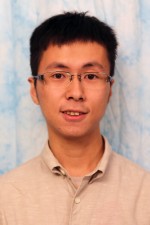
MSR Thesis Defense
August

Carnegie Mellon University
1:00 pm to 2:00 pm
Scaife Hall 224
Natural muscles, a result of more than 500 millions years of evolution, are elegant machines that generate force and motion electrochemically. The brief history of robotics does not have the luxury of millions of years to reverse-engineer many aspects of life. The development of artificial muscles therefore seeks to build more muscle-like actuators for robots.
Recent advances in the engineering of soft materials have led to the exploration of new paradigms for building artificial muscles from matters that share similar properties with biological tissues. A diversity of physical phenomena has also been used to drive an actuator. Among those are the control of the surface energy of a liquid metal, which often has a significant surface tension which becomes predominant at very small (~mm and ~μm) scales.
This work formulates a paradigm for building artificial muscles by identifying eutectic gallium-indium (EGaIn), a liquid metal alloy (~15.5 °C) which has a very large surface tension (~624 mN/m) in the absence of surface gallium oxide (Ga2O3), as an active material and demonstrates key points in the realization a new class of artificial muscles based on the remarkable controllability of surface tension by electrocapillarity and surface oxidation with small voltages (~1 V).
Two different form factors are demonstrated. First, a hybrid structure of coil spring and EGaIn that is capable of contraction in an aqueous sodium hydroxide (NaOH) solution is modeled and experimentally characterized. Second, a caviar-like hybrid of EGaIn and polyacrylamide-sodium-hydroxide (PAAm-KOH) hydrogel as an equivalent device is hypothesized and validated. Limitations and issues are discussed.
A broader perspective is also provided on the role and uniqueness of this artificial muscle paradigm in the current robotics landscape.
Committee:
Prof. Carmel Majidi, Chair
Prof. Matthew Travers
Eric Markvicka, Ph.D.